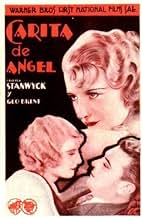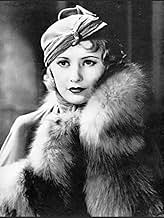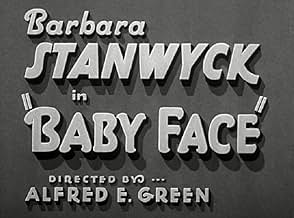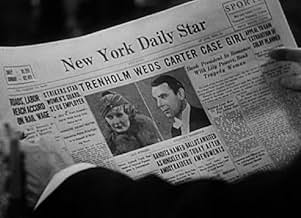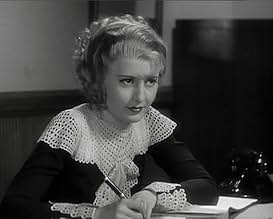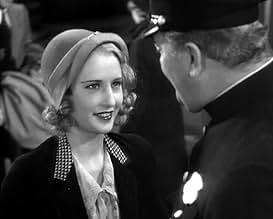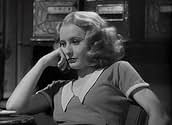Une jeune femme, exploitée sexuellement toute sa vie, décide de renverser la situation et d'exploiter les hommes d'une grande banque de la ville en couchant allègrement avec eux pour accéder... Tout lireUne jeune femme, exploitée sexuellement toute sa vie, décide de renverser la situation et d'exploiter les hommes d'une grande banque de la ville en couchant allègrement avec eux pour accéder aux échelons supérieurs.Une jeune femme, exploitée sexuellement toute sa vie, décide de renverser la situation et d'exploiter les hommes d'une grande banque de la ville en couchant allègrement avec eux pour accéder aux échelons supérieurs.
- Réalisation
- Scénario
- Casting principal
- Récompenses
- 2 victoires au total
- Brody
- (as Douglas Dumbrille)
- Job Seeker
- (non crédité)
- Foward
- (non crédité)
- Paris Bank Clerk
- (non crédité)
- Hodges
- (non crédité)
- Speakeasy Waiter
- (non crédité)
- Speakeasy Customer
- (non crédité)
- Paris Bank Agent
- (non crédité)
Avis à la une
This is starkly displayed in Baby Face which was a pre code film and it is more frank in its use of sex as a means of getting what you want.
Lily Powers (Barbara Stanwyck) has been pimped out by her father since she was 14 year of age. Her father runs an illegal drinking den in Pittsburgh. Most of the patrons want to get an eyeful and feel of Lily.
When her father is killed, an elderly friend tells Lily to take a leaf out of the writings of Friedrich Nietzsche and go for greater things even if she has to use men. Lily and her afro american friend Chico (Theresa Haris) hop on a freight train for New York.
When they arrive in the big metropolis, Lily uses her feminine charms to get a job in a bank and go up the corporate ladder by sleeping her way to the top. This leads to tragedy when one of her suitors commits a murder and then kills himself.
The film with its frankness feels like a breath of fresh air. It actually looks modern. Stanwyck is alluring, there is a small early role for John Wayne, one of Lily's amorous victims. The film is unusual with Lily being close to a black character. Watching the restored version was like viewing a lost classic.
Barbara Stanwyck is indeed amazing in the role of Lily Powers (notice the moniker), a part that called for just the right amount of sexuality coated with power, cunning, and revenge, yet tinged with virginal pretense when called for, a very difficult portrayal to make convincing. Barbara Stanwyck conveys the necessary nuances to show that though she sleeps her way to the top (literally), she still has good in her heart--note the way she treats those few who have been kind to her such as Chico (the marvelous actress Theresa Harris) and the old philosopher. And though she exploits her sexuality to make mush of men who are rich and powerful, those same men are attempting to exploit her for their carnal desires with no intention of permanent ties until they fall in love with her.
Lily Powers fails to understand, at first, that emotions are difficult to ride, that it's easy to lose control. One possible result is death. Hitching a wagon to a star of course materialism can take one to a destination where nothing else exists but the ephemeral, and it's a cold lonely location.
A word should be said about the philosophy of Friedrich Nietzsche whose will to power is stressed in "Baby Face" by the elderly philosopher who befriends Lilly when she is still turning tricks for her old man. "Baby Face" was released the same year Adolf Hitler came to power in Germany. Though it's highly unlikely that the semi-literate Hitler understood much about Nietzsche, he considered himself a Nietzschean to the nth degree and touted it along side his other rantings. "Baby Face" serves as an indictment of the popular interpretation of Nietzsche's will to power concept, especially in the final scenes.
Although "You've got the cutest little baby face." is apropos as a theme for "Baby Face," an even more telling and applicable melody is W. C. Handy's "St. Louis Blues" played throughout the film, especially at times when the camera has to drift away from what would otherwise be sexually explicit scenes. "St. Louis Blues" is also used wisely toward the end as Lily begins to see beyond materialism to eternal values. Chico is singing a raw, salacious version of "St. Louis Blues" when Lily, now disagreeing with the lyrics, orders her to stop.
The restored version of "Baby Face" makes the film more modern in its approach and attitude toward sex as power than many a new Hollywood release. By all means watch this gem from the distant past and enjoy.
The focal point is on Lily Powers (Barbara Stanwyck), the sassy daughter of Nick (Robert Barrat), an abusive father of the slums of Pittsburgh who has her working as a barmaid in his speakeasy entertaining low-life factory working friends. After Nick is killed in an explosion, by which Lily watches, showing no remorse or emotion whatsoever, decides on leaving her hometown, accompanied by her friend, Chico (Theresa Haris) on a freight train for New York City. Upon her arrival, Lily uses whatever life has taught her to get ahead, rising up the corporate latter of a banking firm, by showing her feminine wiles to full advantage. Becoming responsible for the breakup between banker, Ned Stevens (Donald Cook) and his fiancée, Ann Carter (Margaret Lindsay), followed by a murder/suicide, the notorious scandal finds Lily about to transferred to the Paris branch until she captures the attention of Trenholm (George Brent), the new president of the Botham Trust Company, as her latest victim.
Featured in the supporting cast are Douglass Dumbrille (Brody, another one of Lily's "love slaves"); Nat Pendleton (Stolvich, a sleazy factory worker); Maynard Holmes (a personnel office clerk); with Alphonse Ethier, Henry Kolker and Charles Coleman in smaller roles. Along with Dumbrille, Cook and Kolker as men who fall prey to a gal called Lily, the biggest surprise is finding the youthful John Wayne, years prior to his major star status, as one of Lily's rejected suitors. Wayne's role as an office clerk is brief but noteworthy as being the one and only collaboration of the "Duke" and "Stanny." James Murray, the leading actor in MGM's silent masterpiece, THE CROWD (1928), in a career setback by this time, appeared briefly as a railroad brakeman. His scene, however, was taken out prior to its release. A director's complete cut that included Murray and other edited scenes were later discovered and presented on TCM for the first time December 4, 2006.
A dress rehearsal for some of her latter tough-as-nails dramas as DOUBLE INDEMNITY (1944) and THE STRANGE LOVES OF MARTHA IVERS (Paramount, 1946), for example, Stanwyck plays Lily Powers to the hilt, a strong-willed woman with a lot of hate, especially towards men. When pitting them to their own destruction, her eyes stay motionless, detailing reactions through silence rather than with words. Regardless of movie title and popular song by Benny Davis and Harry Akst (scored during the opening credits) that could have served as a Broadway musical about a cute chorus girl, Stanwyck, hardly a "baby face" by any means, is referred to as such once by Jimmy McCoy (John Wayne) and office secretaries (one played by Toby Wing), but never referred to that name again. Aside from other songs, "I Kiss Your Hand, Madame" is underscored several times during the latter portion of the story.
A forerunner to the "trash" movies of the 1960s and 70s, what makes BABY FACE so watchable is the explicit way it uses sex and immorality out of camera range, leaving questionable situations to the imagination of the viewer. A prime example is witnessing Lily's job promotion up the corporate latter with the camera panning from the outside office window from personnel, filing, mortgage and accounting departments to the underscoring of burlesque-type music.
Could anyone else but Barbara Stanwyck handle such an assignment as depicted in BABY FACE? Joan Blondell, another resident Warner Brothers stock player, perhaps, considering how Stanwyck's blonde hairstyle bears a strong resemblance to Blondell's, especially during the more glamorized moments in the film's second half. Blondell, might have handled her task well, but the major difference is that Blondell, as good as she is, or was, wouldn't have handled the forcefulness the way Stanwyck had. Stanwyck, a brunette, was at her best playing nasty blondes, especially here and a decade later in DOUBLE INDEMNITY (1944).
Aside from BABY FACE as one of the favorites shown on TCM, it did have some exposure during the early 1990s on Turner Network Television (TNT) and distribution to home video as part of Leonard Maltin's "Forbidden Hollywood" series, and finally on DVD. For a worthwhile introductory to "pre-code" movies, either the complete or theatrical edited release of BABY FACE, along with Stanwyck's earlier NIGHT NURSE (1931), should be tops in the assembly line. (**1/2)
After her father dies, one older father type who knows what she's been through and truly cares about her future advises her to go to the big city and take advantage of opportunities there - and not the easy ones - and to take the high road in life. (Note that I saw the censored version and not the uncut - this part of the film was redone for the censors.)
She and Chico (Harris) go to New York where Lily (nickname: Baby Face) decides the low road's a lot smoother and will get her where she wants to go a lot faster. In the movie's most famous scene, the camera moves us up the corporate ladder by taking us from floor to floor as Lily sleeps her way to the top. She finally corrals the big man himself and is able to quit her day job. Trouble follows, and she's soon involved in a huge scandal.
Stanwyck wears lots of makeup and for most of the film is cool as a cucumber as she seduces one man after another with no regrets, and she's great at playing the innocent victim. In one scene, she sits staring at a king's ransom in jewels while wearing a black dress that looks like it's decorated with diamonds at the top. Then she asks Chico for another case, and that's filled with more jewelry, plus securities. All in a day's work.
Theresa Harris was an interesting talent - she could be played down or glamorous, and was a talented singer and dancer as well. Here, she sings or hums the movie's theme, "St. Louis Woman" throughout. She worked in literally dozens of movies and is very good here as a friend of Stanwyck's, her best work being in the precode era. As a bizarre byproduct of the code, blacks were often given less to do in films after it was put in place.
Precode films could be more sexually blatant and therefore, though they're 70+ years old, seem more modern. Even though these films didn't have to have moral endings, Baby Face learns her lessons - how like life it is after all. There were several endings of this film, all with the same message. The one I saw had an added scene, but apparently, there were two other endings that didn't pass the censors. (There wasn't a code but there were always censors.) At any rate, it's a neat surprise. "Baby Face" is an important film in movie history - a must see.
Le saviez-vous
- AnecdotesIn 2004, when Michael Mashon, a curator of the motion picture division at the Library of Congress, received a request for a print of this film, he discovered two negatives of the film: the original camera negative and a "duplicate negative" that was longer. The duplicate negative was the pre-release (uncensored) version of the film that was submitted to the New York State censorship board in 1933 for approval. The uncensored version received its public premiere at the London Film Festival in November 2004, more than 70 years after it was made. The existence of these negatives allows pristine quality prints to be made as compared to other surviving films of that era.
- GaffesWhen Lily reads from Nietzsche's book, Thoughts Out Of Season, the page that's highlighted repeats the same paragraph above, and again below, the highlighted lines.
- Citations
Nick Powers: You little tramp, you!
Lily Powers: Yeah, I'm a tramp, and who's to blame? My Father. A swell start you gave me. Ever since I was fourteen, what's it been? Nothing but men! Dirty rotten men! And you're lower than any of them. I'll hate you as long as I live!
- Versions alternativesThe original release had to be cut by four minutes to pass inspection by the New York Board of Censors. The cuts were mostly very minor, but the most notable were the scene where Lily admits that she began working as a prostitute when she was fourteen and the scene in the boxcar with the yardman, the closeup of the hand turning out the light. These scenes were cut before the film's release in 1933 and were not seen publicly until 2004.
- ConnexionsFeatured in The Love Goddesses (1965)
- Bandes originalesBaby Face
(1926) (uncredited)
Music by Harry Akst
Played during the opening credits
Played as background music often
Reprised on a phonograph record
Meilleurs choix
- How long is Baby Face?Alimenté par Alexa
Détails
Box-office
- Budget
- 187 000 $US (estimé)
- Durée
- 1h 11min(71 min)
- Couleur
- Mixage
- Rapport de forme
- 1.37 : 1



